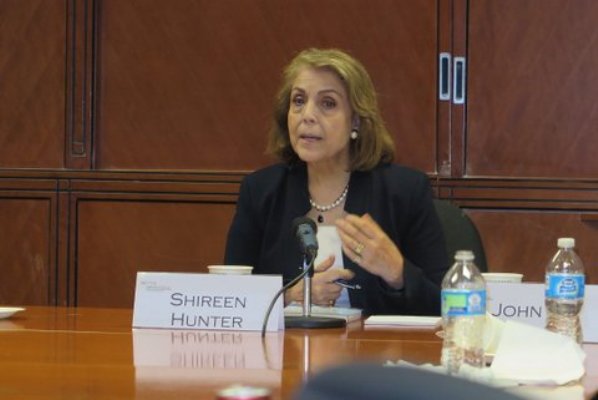Ease in Saudi-Iran tensions will help Kuwait: Shireen Hunter

TEHRAN - Shireen Tahmaasb Hunter, a professor of political science at Georgetown University, tells the Tehran Times that the “visit of the Emir of Kuwait's emissary to Iran could be an indirect way of preparing for possible Iran-Saudi Arabia talks."
Hunter says the tension between Iran and Saudi Arabia has had “negative impact on Kuwait". Hunter says, “Any improvement in Saudi-Iran tensions will help Kuwait as well.”
Following is the text the interview:
Q: Kuwait’s foreign minister visited Iran on Wednesday to present a written message from the country’s Emir to President Rouhani for reducing tension between Iran and certain Arab countries. What is the importance of the message?
A: The visit of the Emir of Kuwait's emissary to Iran could be an indirect way of preparing for possible Iran-Saudi Arabia talks further down the road. If this should be the case, then the trip could be quite important. It also could reflect the fact that Saudi-Iran tensions have had negative impact on Kuwait itself. For example, Saudi Arabia's spread of Salafism in Kuwait have caused sectarian tensions and have undermined Kuwaiti democracy. Even the ruling family have not been immune from these negative consequences as Kuwait's somewhat more independent foreign policy, including towards Iran, has angered the Saudis. Any improvement In Saudi-Iran tensions will help Kuwait as well.
Q: During the visit, the two sides emphasized transparent dialogue between Iran and Arab countries on the southern shores of the Persian Gulf. Any comments on this?
A: After the creation of the GCC, major issues in Iran -Persian Gulf Arab relations have been approached in the context of the GCC. By and large the GCC states have had similar approaches towards Iran with the exception of Oman. Moreover, most GCC countries have similar problems with Iran. Some of these problems are due to the disparity between Iran and the GCC states, except Saudi Arabia, in terms of size and population plus differences in political ideology and attitude vis-a-vis world powers. Therefore it make sense that discussion or dialogue should take place at the level of Iran-GCC.
“Saudi Arabia's spread of Salafism in Kuwait have caused sectarian tensions and have undermined Kuwaiti democracy.”Q: On What areas should the sides start negotiations?
A: At the beginning, the dialogue should focus on the most significant causes of current discord in Iran-GCC ties, such as Bahrain, Yemen, Iranian pilgrimage to Hajj etc. Underlying all these differences is the GCC states' perception that Iran is still a revolutionary country and wants a change in the political system of the (Persian) Gulf states. Although Iran has acted cautiously in the face of much provocation its rhetoric is still threatening to these states.
Q: A day before coming to Iran, NATO established it first regional office in Kuwait. From the Iranian perspective, NATO and other outsiders pose a threat. How can Iran and these countries agree on a regional security order under the shadow of NATO?
A: NATO's recent presence in Kuwait is part of its post-Cold War strategy of establishing partnerships with countries outside of its geographical mandate. Also, the Persian Gulf is still very important to Europe and the United States. NATO's presence is intended to help secure these interests and also reassure the Persian Gulf Arabs.
As the largest country in the region, Iran has always been against the presence of outside powers. Even under the monarchy Iran always said that the security of the Persian Gulf should be the responsibility of "riparian" states. But, of course great powers and the local states have never accepted this. They see this concept as serving Iran's goal of becoming the dominant power in the region.
Consequently, Arab states have always welcomed foreign presence form the British to the Americans and now NATO.
Leave a Comment